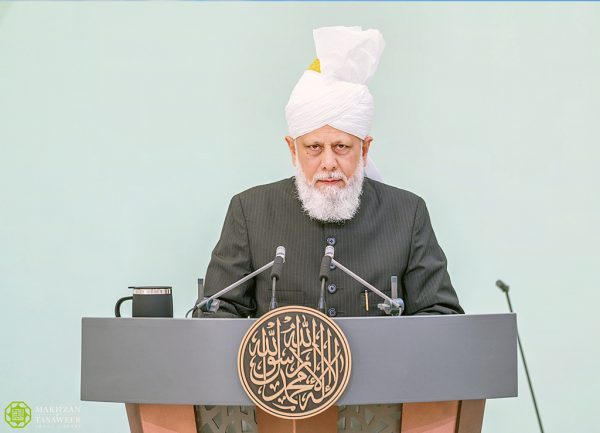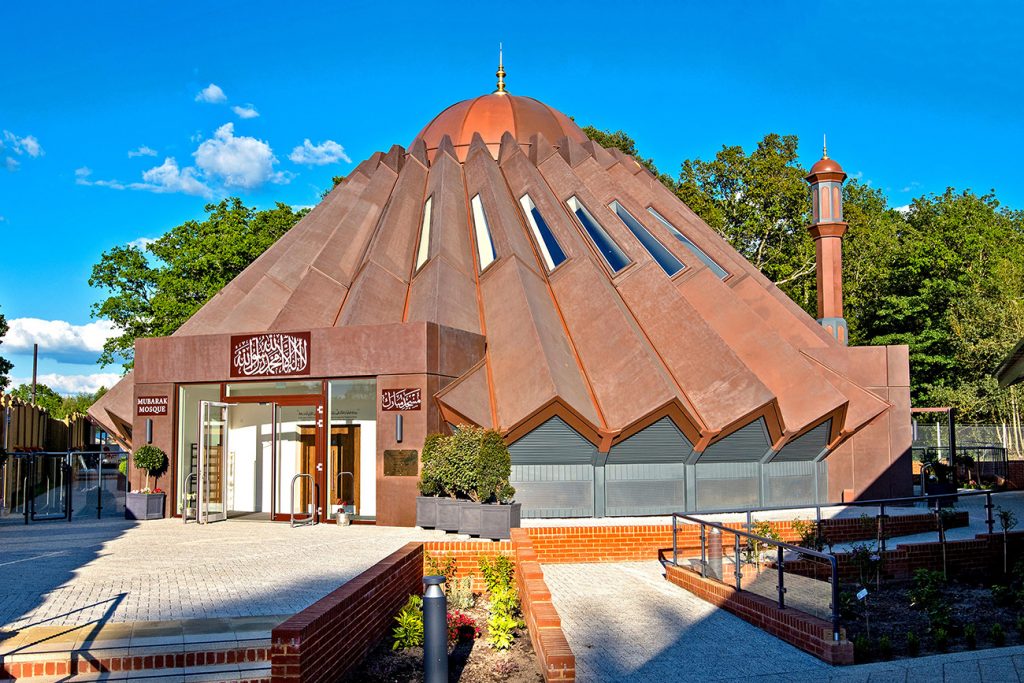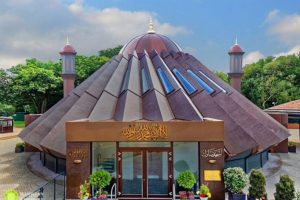After reciting Tashahhud, Ta’awwuz and Surah al-Fatihah, His Holiness, Hazrat Mirza Masroor Ahmad (aba) continued mentioning incidents related to the Conquest of Makkah.

Incident of the Keys to the Ka’bah
His Holiness (aba) said that at the time of the Conquest of Makkah, the keys to the Ka’bah were in the possession of Uthman bin Talhah. Hazrat Ali (ra) requested that he be given the keys to the Ka’bah; however, the Holy Prophet (sa), upon emerging from the Ka’bah, returned the keys of the Ka’bah to Uthman bin Talhah (ra), who by that point had accepted Islam.
His Holiness (aba) said that once, before his migration, the Holy Prophet (sa) had asked Uthman bin Talhah for the keys to the Ka’bah, and in response, Uthman used foul language against the Holy Prophet (sa). At that instance, the Holy Prophet (sa) told Uthman to remember that one day, the keys to the Ka’bah would inevitably fall into his possession and he would give the keys to whomever he pleased. Uthman replied that if such a time did come, it would be a day of humiliation for the Quraish. The Holy Prophet (sa) said that, on the contrary, it would be a day of honour.
His Holiness (aba) said that the Holy Prophet (sa) remembered all of these things and the ways in which he was treated and dealt with. However, in response, the Holy Prophet (sa) displayed mercy and kindness. On the day of the Conquest of Makkah, Uthman would also have remembered that instance, yet the Holy Prophet (sa) said that he should take the keys and that they would remain in the possession of his family. To this day, the keys of the Ka’bah remain in the possession of Uthman bin Talhah’s (ra) lineage.
The Sanctity of Makkah
His Holiness (aba) said that on the second day of the Conquest of Makkah, the Banu Khuza’ah killed a man from the Banu Hudhail. The Holy Prophet (sa) addressed the people and said that God had made Makkah sacred since he created the heavens and earth, the sun and the moon, and the mountains Safa and Marwah. It was not made sacred by people; rather, it was made sacred by God, and it would remain so until the Day of Judgement. Hence, it was not lawful for anyone to shed blood within it or cut down its vegetation. These things were not lawful for anyone before, nor after the Holy Prophet (sa). It was made lawful for the Holy Prophet (sa) only for a specific portion of a certain day. The Holy Prophet (sa) then addressed the Banu Khuza’ah, saying that they must not kill anyone. For the man they had already killed, the Holy Prophet (sa) said he would offer the blood money of a hundred camels himself. Thereafter, the Holy Prophet (sa) said that if anyone killed someone, the deceased’s loved ones could demand blood money or equal retribution.
His Holiness (aba) said that it was during those days that Fudalah bin Umair’s plot to assassinate the Holy Prophet (sa) was exposed. He was among the crowd when the Holy Prophet (sa) was circling the Ka’bah, and he had planned to attack the Holy Prophet (sa) with his dagger. As Fudalah drew near, the Holy Prophet (sa) saw him and he asked him what he was thinking about. Fudalah lied and said that he was remembering God. The Holy Prophet (sa) smiled and told him to seek forgiveness from Allah, because he knew he was lying. He then approached Fudalah and placed his hand on his chest. Fudalah himself states that when the Holy Prophet (sa) removed his hand from his chest, by that time there was no one more beloved to him in the world than the Holy Prophet (sa), and he abandoned his original plan.
Hazrat Abu Bakr’s (ra) Father Accepts Islam
His Holiness (aba) said that it was also in those days that Hazrat Abu Bakr’s (ra) father accepted Islam. When the Holy Prophet (sa) entered the Sacred Mosque, Hazrat Abu Bakr (ra) brought his father to the Holy Prophet (sa). Upon seeing him, the Holy Prophet (sa) asked Hazrat Abu Bakr (ra) why he had brought such an elderly person there, when he could have gone to him. Hazrat Abu Bakr (ra) said that he felt it was more appropriate that he be brought to the Holy Prophet (sa). Then, the Holy Prophet (sa) placed his hand upon Hazrat Abu Bakr’s (ra) father’s chest and invited him to Islam, upon which he accepted.
The Victor of Makkah’s Love for Simplicity
His Holiness (aba) said that on the day of the Conquest of Makkah, the Holy Prophet (sa) asked Hazrat Umm Hani (ra) if she had anything to eat at home. She replied that she had some dry bread and nothing else, but she was ashamed to present that to the Holy Prophet (sa). However, the Holy Prophet (sa) said that it would suffice and asked for it to be brought. When she brought the dried bread, the Holy Prophet (sa) asked if she had any sort of stew, to which Hazrat Umm Hani (ra) replied that she only had vinegar. The Holy Prophet (sa) asked for the vinegar to also be brought, and he poured it over the bread. He ate it and thanked God, saying that vinegar is the best stew or sauce. This was the conduct of the Victor of Makkah, who could have had anything he wanted, yet he chose the simple meal of dried bread and vinegar.
The Holy Prophet’s (sa) Expression of Love in Makkah
His Holiness (aba) said that there were many instances and expressions of love and devotion on the occasion of the Conquest of Makkah. For example, it is recorded that the Holy Prophet (sa) kissed the Black Stone, circled the Ka’bah, then went atop Mount Safa where he remembered God and prayed to Him. The Ansar of Madinah (natives of Madinah) were below the Holy Prophet (sa) while he was on the mountain, and they followed suit in remembering Allah. Having seen the immense mercy and kindness the Holy Prophet (sa) had shown to the Makkans, there were whispers among the Ansar as to whether the Holy Prophet (sa) would now remain among his family and kinsfolk. Thinking of the potential separation from the Holy Prophet (sa), the Ansar became very sad. During this time, the Holy Prophet (sa) received a revelation, after which he asked the Ansar if they were worried that he would be overcome by his love for Makkah. The Ansar replied that this was what they had been wondering. The Holy Prophet (sa) said that he had migrated to Madinah for the sake of Allah, and that his life and death were now with them. The Ansar started crying profusely and said that they had only wondered this out of their extreme love and devotion for the Holy Prophet (sa). The Holy Prophet (sa) said that Allah and His Messenger (sa) attested to this and accepted their excuse.
His Holiness (aba) said that as the Holy Prophet (sa) was walking and the companions were following him, Abu Sufyan saw them and said that he wished he could assemble an army and fight with them again. He was thinking this quietly and hadn’t said anything out loud; however, the Holy Prophet (sa) approached him, put his hand on his chest and said that if he did so again, then Allah would humiliate him again. Afterwards, Abu Sufyan regretted having this thought.
His Holiness (aba) said that when it came time for prayer, the Holy Prophet (sa) instructed Hazrat Bilal (ra) to climb atop the Ka’bah and deliver the call for prayer. It is recorded that on that day, the Holy Prophet (sa) offered all his prayers while only having performed ablution once in the day.
Hind and Others of the Quraish Accept Islam
His Holiness (aba) said that on that day, the Holy Prophet (sa) renewed the pledge of allegiance. All people came to the Holy Prophet (sa) and pledged that there is no god except Allah and that Muhammad (sa) is His Messenger, and that they would always show obedience to Allah and His Messenger (sa). First, the Holy Prophet (sa) took the pledge of allegiance from the men, after which he took the pledge of allegiance from the women. When the Holy Prophet (sa) was taking the pledge from women and said that they must pledge not to steal, Hind, wife of Abu Sufyan, spoke up and said that she would sometimes take from the wealth of Abu Sufyan. Abu Sufyan was nearby and said that anything she had taken to that point was forgiven and lawful for him. The Holy Prophet (sa) inquired if she was Hind, as at that time she had veiled her face. She replied that it was indeed her, and requested the Holy Prophet (sa) to forgive all that she had done before that point. The Holy Prophet (sa) said that she and the women should pledge not to commit any indecency, and not to kill their progeny. Hind replied that she had raised her progeny, who was then killed by them at the Battle of Badr. Upon this, the Holy Prophet (sa) and Hazrat Umar (ra) laughed. Then, the Holy Prophet (sa) said she must pledge not to level any false allegations, and not to disobey the commandments of the Holy Prophet (sa). After the pledge of allegiance, Hind, who had a quick tongue, said that now she had become a Muslim, the Holy Prophet (sa) could not kill her. The Holy Prophet (sa) laughed and said that indeed it was true. That day, such a change was brought about in the people, that even someone like Hind attested that there was only One God.
His Holiness (aba) said that one person who had come to the Holy Prophet (sa) to pledge allegiance was so awestruck by the Holy Prophet (sa) that he was shaking. The Holy Prophet (sa) told him not to be scared, saying that he was not a king; rather, he was the son of a woman who ate dried meat in Makkah.
Rebuttal of Allegation Regarding Individuals Ordered to Be Killed
His Holiness (aba) said that there are certain narrations which relate that during the Conquest of Makakh, there were certain people whose execution was ordered by the Holy Prophet (sa). However, an analysis of such narrations, and the conduct and character of the Holy Prophet (sa) negate the possibility of any such action being taken by the Holy Prophet (sa).
His Holiness (aba) quoted Hazrat Mirza Bashiruddin Mahmud Ahmad (ra), the Second Caliph, who said that there were 11 people who had committed such crimes that warranted execution for their war crimes. However, despite this, the majority of these people were forgiven by the Holy Prophet (sa) upon the recommendation of other Muslims. This echoes the view of the Promised Messiah, Hazrat Mirza Ghulam Ahmad (as) as well.
His Holiness (aba) said that some historians are mistaken in the views that they present in this regard, as some of them say that the Holy Prophet (sa) ordered the execution of such people who wrote poetry against him. However, this could never have been the case as the Holy Prophet (sa) never took personal retribution. What’s more, the Holy Prophet (sa) forgave such people during the Conquest of Makkah who had done much worse. Even the Jewish woman who had presented the Holy Prophet (sa) with poisoned meat was forgiven by the Holy Prophet (sa). Hence, there is no sense in saying that the Holy Prophet (sa) would order the execution of those who spoke against the Holy Prophet (sa). As the Promised Messiah (as) has explained, only a couple of people were handed the punishment of execution and that too solely as lawful retribution for murders they had committed, a punishment which was established by God Himself.
His Holiness (aba) said that he would continue mentioning these incidents in the future.

Appeal for Prayers
His Holiness (aba) made an appeal for prayers for the state of the world. Everyone must continue praying for the world. His Holiness (aba) said that as he has reminded many times before, people should gather rations for at least a few months. In fact, even some governments have started telling their citizens to do the same. May Allah have mercy on the world and save it from the dreadful conditions of war.
Funeral Prayers
His Holiness (aba) said that he would lead the funeral prayers of the following deceased members:
Amatul Naseer Nighat
Amatul Naseer Nighat wife of Raja Abdul Malik. She was the granddaughter of Hazrat Mirza Sharif Ahmad (ra) and the daughter of Colonel Mirza Daud Ahmad. She lived for many years in the United States, where she served the Ahmadiyya Muslim Women’s Auxiliary Organisation for about ten years. She was regular in giving alms and charity. She helped the poor, even helping some build their homes. She was very hospitable and caring. She prayed a great deal and with great fervour. She would often recite the poetic couplets written by the Promised Messiah (as). She was very kind to her neighbours and her relatives. His Holiness (aba) prayed that may Allah grant her forgiveness and mercy.
Al Haj Yaqoub Ahmad bin Abu Bakr
Al Haj Yaqoub Ahmad bin Abu Bakr former headmaster of the Ahmadiyya Senior High School who recently passed away in a car accident. He is survived by two wives, four children, his mother and brother. He dedicated his life for the service of Islam Ahmadiyyat. He was sent by the Community to study business administration and was later offered a job by the government, but he turned them down to instead serve the Community. He also served as the National Secretary for Outreach. He was a scholarly person and was part of various academic committees, councils and boards. He is remembered as a principled and great leader. He always attributed all of his success to remaining attached with the Community and Khilafat. He possessed many virtuous qualities. Not only was he a great leader, but he was also very humble. His Holiness (aba) said that he was very close with him during his time in Ghana and they were great friends. Whenever His Holiness (aba) needed someone he could trust to do something, he would go to him as he was very trustworthy. He was extremely loyal to Khilafat. He left a legacy of worship and obedience for his family. His Holiness (aba) prayed that may Allah grant him forgiveness and mercy and enable his children to follow the legacy of his virtues and loyalty.
Summary prepared by The Review of Religions



Add Comment